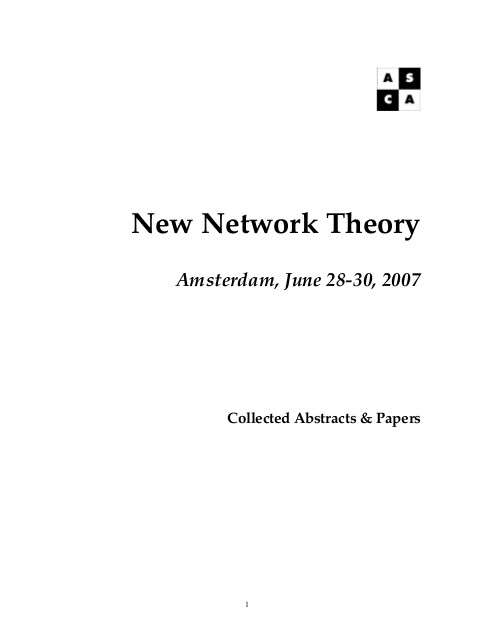New Network Theory: Collected Abstracts and Papers (2007)
Filed under proceedings | Tags: · actor-network theory, aesthetics, assemblage, internet, locative media, network culture, networks, social movements, web, web 2.0

On 28 – 30 June 2007, the Institute of Network Cultures and Media Studies, University of Amsterdam and the Amsterdam School for Cultural Analysis, organized the international conference New Network Theory. The object of study has shifted from the virtual community and the space of flows to the smart mob. When the object of study changes, so may the distinctions that dominate, particularly the schism between place-based space and place-less space, both organized and given life by networks. New Network Theory explored contemporary network theory that suits and reflects the changes to the objects of study that come to define our understandings of network culture – a post-Castellsian network theory, if you will, that takes technical media seriously.
themes: network theory, the link, locative media, networks and subjectivities, networking and social life, art and info-aesthetics, actor-network theory and assemblage, networks and social movements, mobility and organisation, anomalous objects and processes, and the global and the local.
speakers: Katy Börner, Wendy Chun, Noshir Contractor, Florian Cramer, Rob Stuart, Jean-Paul Fourmentraux, Matthew Fuller, Valdis Krebs, Olia Lialina, Noortje Marres, Anna Munster, Warren Sack, Alan Liu, Ramesh Srini-vasan, Tiziana Terranova, Siva Vaidhyanathan, and many others.
PDF
Three additional papers (Verheij, Cramer, Goriunova)
#public_life: Digitale Intimität, die Privatsphäre und das Netz (2011) [German]
Filed under book | Tags: · democracy, internet, intimacy, networks, privacy, public sphere, web, web 2.0

Immer mehr Menschen äußern sich im Internet nicht nur zu politischen Fragen, sondern auch zu ihrem Konsumverhalten oder ihren sexuellen Vorlieben, sie zeigen das Innere und Äußere ihrer Wohnung, lassen uns an den kleinen und großen Dingen ihres Lebens teilhaben. Gleichzeitig wird es durch die entsprechende Software immer leichter, Nutzerprofile zu erstellen, die den Menschen durchsichtig machen und marktförmig. So oder so: Die Grenzen zwischen dem Privaten und dem Öffentlichen verschwimmen, die Sphären durchdringen einander. Bleiben bei diesem Prozess die Persönlichkeitsrechte und das Politische auf der Strecke?
Die Beiträge im vorliegenden Sammelband #public_life untersuchen vor dem Hintergrund der digitalen Drift die Bedeutung von Privatheit und Öffentlichkeit heute. Die Gegensätzlichkeit der Positionen, die an Privatsphäre und Kontrollanspruch festhalten oder das Zeitalter von Post-Privacy ausrufen, scheuen sie dabei nicht.
Mit Beiträgen u. a. von Clive Thompson, Danah Boyd, Helen Nissenbaum, Daniel J. Solove, Malte Spitz, M. Ryan Calo, Francesca Schmidt, Jan Schallaböck und Michael Seemann.
Editor: Simon Edwin Dittrich
Publisher: Heinrich-Böll-Stiftung, Berlin, April 2011
Schriften zu Bildung und Kultur series, Nr. 8
ISBN 978-3-86928-052-3
128 pages
Licensed under Creative Commons License BY-NC-ND 3.0 DE
Marc Stumpel: The Politics of Social Media. Facebook: Control and Resistance (2010)
Filed under thesis | Tags: · facebook, floss, open source, protocol, resistance, software, tactical media, web, web 2.0
This thesis examines the governance of contemporary social media and the potential of resistance. In particular, it sheds light on several cases in which Facebook has met with resistance in its attempt to exercise control. This social networking site has raised concerns over privacy, the constraints of its software, and the exploitation of user-generated content.
By critically analyzing the confrontations over these issues, this thesis aims to provide a framework for thinking about an emerging political field. This thesis argues that discursive processes and (counter)protocological implementations should be regarded as essential political factors in governing the user activities and conditions on large social networking sites.
A discourse analysis unveils how Facebook enacts a recurrent pattern of discursive framing and agenda-setting to support the immediate changes it makes to the platform. It shows how contestation leads to the reconfiguration and retraction of certain software implementations. Furthermore, a software study analyzes how the users are affected by Facebook’s reconfiguration of protocological assemblages. Several tactical media projects are examined in order to demonstrate the mutability of platform’s software.
Keywords: Facebook, Network-making power, Counterpower, Framing, Protocol, Tactical Media, Exploitation, Open-source, Agonistic Pluralism, Neodemocracy
Master thesis
Media Studies (New Media), University of Amsterdam
Supervisor: Dr Thomas Poell
Second reader: Dr Geert Lovink
Date: August 16, 2010
82 pages

